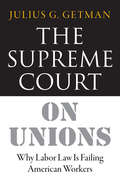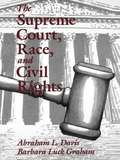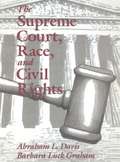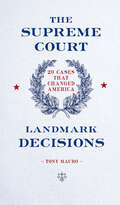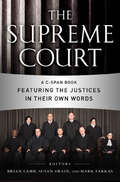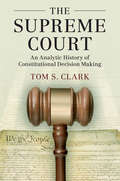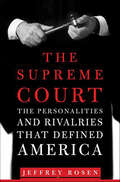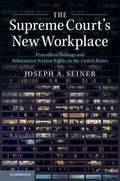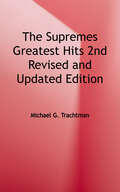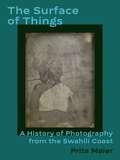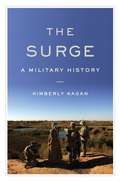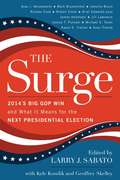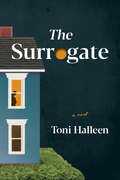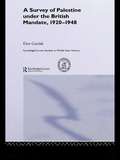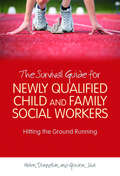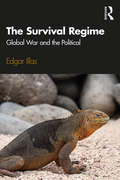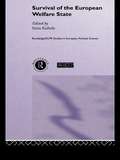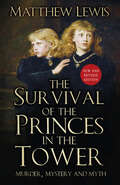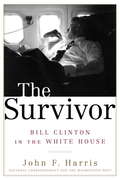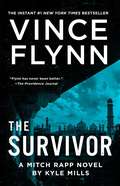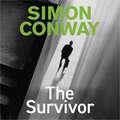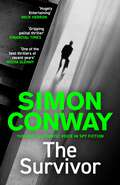- Table View
- List View
The Supreme Court on Unions: Why Labor Law Is Failing American Workers
by Julius G. GetmanLabor unions and courts have rarely been allies. From their earliest efforts to organize, unions have been confronted with hostile judges and antiunion doctrines. In this book, Julius G. Getman argues that while the role of the Supreme Court has become more central in shaping labor law, its opinions betray a profound ignorance of labor relations along with a persisting bias against unions. In The Supreme Court on Unions, Getman critically examines the decisions of the nation's highest court in those areas that are crucial to unions and the workers they represent: organizing, bargaining, strikes, and dispute resolution. As he discusses Supreme Court decisions dealing with unions and labor in a variety of different areas, Getman offers an interesting historical perspective to illuminate the ways in which the Court has been an influence in the failures of the labor movement. During more than sixty years that have seen the Supreme Court take a dominant role, both unions and the institution of collective bargaining have been substantially weakened. While it is difficult to measure the extent of the Court’s responsibility for the current weak state of organized labor and many other factors have, of course, contributed, it seems clear to Getman that the Supreme Court has played an important role in transforming the law and defeating policies that support the labor movement.
The Supreme Court, Race, and Civil Rights
by Abraham L. Davis Barbara Luck GrahamThis text brings examination and analysis of the Supreme Court's role in civil rights, race, and the law into the 21st century with a multidisciplinary, multiperspective approach. It incorporates information from the disciplines of law, political science, and history; provides an analysis of race and law from the perspective of politically disadvantaged groups and brings together Supreme Court readings vital to the understanding of the continuing evolution of civil rights in the United States.
The Supreme Court, Race, and Civil Rights: From Marshall to Rehnquist
by Abraham L. Davis Barbara Luck GrahamProviding a well-rounded presentation of the constitution and evolution of civil rights in the United States, this book will be useful for students and academics with an interest in civil rights, race and the law. Abraham L Davis and Barbara Luck Graham's purpose is: to give an overview of the Supreme Court and its rulings with regard to issues of equality and civil rights; to bring law, political science and history into the discussion of civil rights and the Supreme Court; to incorporate the politically disadvantaged and the human component into the discussion; to stimulate discussion among students; and to provide a text that cultivates competence in reading actual Supreme Court cases.
The Supreme Court: 20 Cases that Changed America
by Tony MauroA concise, informative guide to the twenty most momentous Court rulings in American history, including excerpts from the written decisions and dissents. The legislative branch of government creates laws, and the executive branch signs and enforces them. But how does America make sure these laws don’t run afoul of the Constitution? That responsibility lies with the final arbiters: the nine justices of the Supreme Court. Every year, thousands of contentious cases are submitted to the court; only about eighty of them are heard. Out of those cases, many are remembered only by the people directly involved. But over the years, many cases heard by the Supreme Court have gone on to affect the lives of many, or even all, American citizens. In The Supreme Court: Landmark Decisions, veteran court reporter Tony Mauro picks out the twenty most momentous Supreme Court cases in United States history. In his reviews, from Marbury v. Madison, the 1803 case that first affirmed the Supreme Court’s status as the country’s final legal arbiter, to Obergefell v. Hodges, the 2015 case that legalized same-sex marriage, Mauro summarizes each case and includes cogent summaries of the justices’ decisions, as well as notable dissents. From a journalist noted by the New York Times for “explaining complex legal issues to laymen without sacrificing accuracy and subtlety,” The Supreme Court: Landmark Decisions serves as your quick, concise, and informative guide to one of the most important, and sometimes least-understood, institutions in the nation.
The Supreme Court: A C-SPAN Book Featuring the Justices in their Own Words
by Brian Lamb Susan Swain C-Span Mark FarkasThe Supreme Court grew out of an historic opportunity to interview all of the living Supreme Court justices for a C-SPAN feature documentary about the Court, the only time that the nine sitting members and their retired colleagues have granted interviews to a single television network. Eleven of those interviews-the entire current court, including the newest member, Justice Elena Kagan-are gathered here in this singular collection. In their conversations with the justices, Brian Lamb and Susan Swain bring readers into a fascinating world to which few have had access. Chief Justice John Roberts talks about the role of the Court in society, his role as chief justice, and the process of deciding cases. Justice Stephen Breyer takes us on a private tour of his chambers and describes the differences between the Court and the Congress. And new Justices Sonia Sotomayor and Elena Kagan reflect on their first impressions of the job. Through these encounters, the justices' personalities, intellects, and devotion to the Court emerge. Enriching this material are Mark Farkas's interviews with journalists, court historians, and other experts on the Court. Reporters Joan Biskupic and Lyle Denniston discuss the Supreme Court in action and the impact of a new member of the Court. Clerk of the Supreme Court William Suter illuminates the traditions of the Court. Historian James O'Hara discusses the Supreme Court building and its history. Former Solicitor General Drew Days III and attorney Maureen Mahoney describe the experience of facing the justices in fast-paced oral arguments. The Supreme Court offers readers a rare window into the nation's highest court through the eyes of those who serve there. It is absorbing reading for anyone interested in this vital and powerful institution.
The Supreme Court: An Analytic History of Constitutional Decision Making (Political Economy of Institutions and Decisions)
by Tom S. ClarkThis book presents a quantitative history of constitutional law in the United States and brings together humanistic and social-scientific approaches to studying law. Using theoretical models of adjudication, Tom S. Clark presents a statistical model of law and uses the model to document the historical development of constitutional law. Using sophisticated statistical methods and historical analysis of court decisions, the author documents how social and political forces shape the path of law. Spanning the history of constitutional law since Reconstruction, this book illustrates the way in which the law evolves with American life and argues that a social-scientific approach to the history of law illuminates connections across disparate areas of the law, connected by the social context in which the Constitution has been interpreted.
The Supreme Court: The Personalities and Rivalries That Defined America
by Jeffrey RosenA leading Supreme Court expert recounts the personal and philosophical rivalries that forged our nation's highest court and continue to shape our daily livesThe Supreme Court is the most mysterious branch of government, and yet the Court is at root a human institution, made up of very bright people with very strong egos, for whom political and judicial conflicts often become personal.In this compelling work of character-driven history, Jeffrey Rosen recounts the history of the Court through the personal and philosophical rivalries on the bench that transformed the law—and by extension, our lives. The story begins with the great Chief Justice John Marshall and President Thomas Jefferson, cousins from the Virginia elite whose differing visions of America set the tone for the Court's first hundred years. The tale continues after the Civil War with Justices John Marshall Harlan and Oliver Wendell Holmes, who clashed over the limits of majority rule. Rosen then examines the Warren Court era through the lens of the liberal icons Hugo Black and William O. Douglas, for whom personality loomed larger than ideology. He concludes with a pairing from our own era, the conservatives William H. Rehnquist and Antonin Scalia, only one of whom was able to build majorities in support of his views.Through these four rivalries, Rosen brings to life the perennial conflict that has animated the Court—between those justices guided by strong ideology and those who forge coalitions and adjust to new realities. He illuminates the relationship between judicial temperament and judicial success or failure. The stakes are nothing less than the future of American jurisprudence.
The Supreme Court’s New Workplace: Procedural Rulings and Substantive Worker Rights in the United States
by Joseph A. SeinerThe US Supreme Court has systematically eroded the rights of minority workers through subtle changes in procedural law. This accessible book identifies and describes how the Supreme Court's new procedural requirements create legal obstacles for civil-rights litigants, thereby undermining their substantive rights. Seiner takes the next step of providing a framework that practitioners can use to navigate these murky waters, allowing workers a better chance of prevailing with their claims. Seiner clearly illustrates how to effectively use his framework, applying the proposed model to one emerging sector - the on-demand industry. Many minority workers now face pervasive discrimination in an uncertain legal environment. This book will serve as a roadmap for successful workplace litigation and a valuable resource for civil-rights research. It will also spark a debate among scholars, lawyers, and others in the legal community over the use of procedure to alter substantive worker rights.
The Supremes' Greatest Hits: The 44 Supreme Court Cases That Most Directly Affect Your Life
by Michael G. TrachtmanCan the government seize your house to build a shopping mall? Can it determine what control you have over your own body? Can police search your cellphone? <p><p>The answers to those questions come from the Supreme Court, whose rulings have shaped American life and justice and allowed Americans to retain basic freedoms such as privacy, free speech, and the right to a fair trial. <p><p>Especially relevant in light of Justice Antonin Scalia's passing, as President Obama gears for a fight over nominating his successor, and as we prepare to elect a new president who may get to appoint other justices, the revised and updated edition of Michael G. Trachtman's page-turner includes ten important new cases from 2010 to 2015. In addition, a special section features analyses of the new term rulings planned for June 2016.
The Surface of Things: A History of Photography from the Swahili Coast
by Prita MeierThe first major history of photography from coastal East AfricaThe ports of the Swahili coast—Zanzibar and Mombasa among them—have long been dynamic centers of trade where diverse peoples, ideas, and materials converge. With the arrival of photography in the mid-nineteenth century, these predominantly Muslim coastal communities cultivated and transformed the medium. The Surface of Things examines the complex maritime dynamics that shaped the photography of coastal Africa, exploring the pleasure and power of beautiful things and the ways people and their pictures transcended the boundaries of the colonial world.Immersing readers in the globally interconnected networks of eastern Africa&’s port cities, Prita Meier demonstrates how photographs are not static images but mobile objects with remarkable shape-shifting qualities. Beginning with the earliest photographs introduced through seaborne commerce, the medium&’s integration into the cultural landscape was swift. Photographs functioned as objects of decoration, good taste, and cosmopolitanism, but were also used by local elites and foreigners to coerce and objectify enslaved people. Meier uncovers the oppressive agenda behind postcards and other popular images while describing African strategies of subversion and rebellion, revealing the performative authority that individuals exerted over their photographic likenesses.Featuring more than two hundred images published here for the first time, The Surface of Things repositions the continent&’s islands and archipelagos at the center of global photographic histories and shows how the people of the African Indian Ocean world experienced photography as a force of both oppression and freedom.
The Surge
by Kimberly KaganUnderstanding the role of combat in the Iraq war is essential for both the American people and the U.S. military. Recognizing the objectives of both sides and the plans developed to attain those objectives provides the context for understanding the war. The Surge is an effort to provide such a framework to help understand not only where we have been, but also what happens as we move forward.
The Surge: The Big 2014 Gop Win and What It Means For the Next Presidential Election
by Larry J. Sabato Alan I. Abramowitz Jill Lawrence Joshua T. Putnam Geoffrey Skelley Michael E. Toner Karen E. Trainer Sean Trende Mark Blumenthal Jamelle Bouie Rhodes Cook Robert Costa Ariel Edwards-Levy James Hohmann Kyle KondikThe 2014 midterm election was one of the most significant in recent memory, with a decisive turning of the tables in favor of Republicans. With a now-Republican-controlled Senate and House at odds with a Democratic president with only two years left in office, the fault lines within and between both parties have never been more tenuous. In this book, prominent elections scholar and political commentator Larry J. Sabato brings together respected journalists and experts from across the political spectrum to examine every facet of the midterm election results and the implications for the 2016 election cycle. In frank, accessible prose, each author offers insight that goes beyond the headlines to analyze what the midterm results mean and what is at stake in the coming presidential race. Contributions by: Alan I. Abramowitz, Mark Blumenthal, Jamelle Bouie, Rhodes Cook, Robert Costa, Ariel Edwards-Levy, James Hohmann, Jill Lawrence, Joshua T. Putnam, Michael E. Toner, Karen E. Trainer, Sean Trende
The Surrogate: A Novel
by Toni Halleen“The Surrogate is a thrilling, high-stakes debut centering on a vulnerable newborn and two women who will do almost anything to claim her as their daughter. With a collection of vividly rendered characters, this twisty tale will leave you thinking about the true meaning of motherhood long after you turn the last page. I loved it!”—Patry Francis, bestselling author of All the Children Are HomeRuth is a no-nonsense fortysomething journalist from the Midwest, desperate for a child with her new husband, Hal. Their hope rests with Cally, a nineteen-year- old who wants to go to college—but doesn’t have the cash. The arrangement seems perfect for everyone.But within a day of the baby’s birth, Cally has a change of heart—and engineers a harrowing escape from the hospital with the newborn. When Ruth and Hal discover that Cally and their daughter are gone, a whole series of doubts and secrets is revealed, and the difference between right and wrong is no longer clear.Set in the vast, sparsely populated upper reaches of northern Minnesota in the middle of winter, The Surrogate follows Ruth, Hal, Cally, through a maze of thought-provoking questions about the nature of family, love, and relationships: What would you do for your partner, when the going gets tough? How much is a pregnancy “worth”? And who, if anyone, “deserves” to be a mother?With its realistic portrayal of surrogacy and motherhood, 'The Surrogate' is a thought-provoking novel that will stay with you long after you've finished reading. Toni Halleen's writing is both literary and suspenseful, making this a must-read for fans of psychological thrillers and domestic dramas.
The Survey of Palestine Under the British Mandate, 1920-1948 (Routledge Studies in Middle Eastern History)
by Dov GavishThis book is a historical study of the survey and mapping system of Palestine under the British Mandate. It traces the background and the reasoning behind the establishment of the survey programme, examines the foundations upon which the system was based, and strives to understand the motivation of those who implemented it. This study shows that the roots of the modern survey system of Palestine are to be sought in the Balfour Declaration and its implications regarding land in Palestine. The land issue was at the core of the mapping of Mandatory Palestine, and it remains as a core issue at the heart of the Israeli-Palestinian dispute.
The Survival Guide for Newly Qualified Child and Family Social Workers
by Helen Donnellan Gordon Jackxx
The Survival Regime: Global War and the Political
by Edgar IllasThe Survival Regime explores the concept of survival to describe the effects on politics of the fusion of war and capital in globalization. Survival defines a sort of degree zero governmentality that has resulted from the crumbling of the political and spatial architecture of modernity, particularly the state. It does not simply name the new content of all politics or the economic law of the strongest of neoliberalism. Rather, it theorizes how systemic violence and permanent instability force political life to struggle for its own existence, thus generating a regime based on productive engagement and urgent intervention. Through a critical dialogue with various contemporary thinkers (Galli, Hardt and Negri, Esposito, Agamben, Derrida, and Schmitt, among others), Edgar Illas theorizes survival as a global logic that overcomes the links between life and power explained by the Foucauldian paradigm of biopolitics. He examines parallel notions such as singularity, aleatoriness, eclecticism, and distinction to question previous theorizations of the political based on class struggle, inclusion, hegemony, or recognition of demands. Through the intersection of different lines of inquiry, including Marxism, war theory, biopolitics, and deconstruction, The Survival Regime contributes to the rethinking of critical theory, political theory, and cultural studies in globalization.
The Survival of Freedom
by Jerry Pournelle John F. CarrStories to set your imagination -- and your spirit -- free...
The Survival of the European Welfare State (Routledge/ECPR Studies in European Political Science #14)
by Stein Kuhnle'Crisis'. 'Breakdown'. 'Dismantlement.' Since the 1970's, these have become the catchphrases used to describe the condition of the welfare states in Europe, in academic and media analyses alike. This book provides an alternative, more optimistic interpretation. It aims to increase both theoretical understanding and empirical knowledge of recent welfare reforms in areas including Spain, Denmark, the UK, Germany and the EU as a whole. An essential resource for students, researchers and practitioners with an interest in the welfare state.
The Survival of the Princes in the Tower: Murder, Mystery and Myth
by Matthew LewisThe murder of the Princes in the Tower is the most famous cold case in British history. Traditionally considered victims of their ruthless uncle, there are other suspects too often and too easily discounted. There may be no definitive answer, but by delving into the context of their disappearance and the characters of the suspects, Matthew Lewis examines the motives and opportunities afresh, as well as asking a crucial but often overlooked question: what if there was no murder? What if Edward V and his brother Richard, Duke of York, survived their uncle’s reign and even that of their brother-in-law Henry VII?In this new and updated edition, compelling evidence is presented to suggest the Princes survived, which is considered alongside the possibility of their deaths to provide a rounded and complete assessment of the most fascinating mystery in history.
The Survivor
by John F. HarrisThe definitive account of one of the most accomplished, controversial, and polarizing figures in American historyBill Clinton is the most arresting leader of his generation. He transformed American politics, and his eight years as president spawned arguments that continue to resonate. For all that has been written about this singular personality-including Clinton's own massive autobiography-there has been no comprehensive, nonpartisan overview of the Clinton presidency. Few writers are as qualified and equipped to tackle this vast subject as the award-winning veteran Washington Post correspondent John F. Harris, who covered Clinton for six of his eight years in office-as long as any reporter for a major newspaper. In The Survivor, Harris frames the historical debate about President William Jefferson Clinton, by revealing the inner workings of the Clinton White House and providing the first objective analysis of Clinton's leadership and its consequences.Harris shows Clinton entering the Oval Office in 1993 primed to make history. But with the Cold War recently concluded and the country coming off a nearly uninterrupted generation of Republican presidents, the new president's entry into this maelstrom of events was tumultuous. His troubles were exacerbated by the habits, personal contacts, and the management style, he had developed in his years as governor of Arkansas. Clinton's enthusiasm and temper were legendary, and he and Hillary Rodham Clinton-whose ambitions and ordeals also fill these pages-arrived filled with mistrust about many of the characters who greeted them in the "permanent Washington" that often holds the reins in the nation's capital.Showing surprising doggedness and a deep-set desire to govern from the middle, Clinton repeatedly rose to the challenges; eventually winning over (or running over) political adversaries on both sides of the aisle-sometimes facing as much skepticism from fellow Democrats as from his Republican foes. But as Harris shows in his accounts of political debacles such as the attempted overhaul of health care, Clinton's frustrations in the war against terrorism, and the numerous personal controversies that time and again threatened to consume his presidency, Bill Clinton could never manage to outrun his tendency to favor conciliation over clarity, or his own destructive appetites. The Survivor is the best kind of history, a book filled with major revelations-the tense dynamic of the Clinton inner circle and Clinton's professional symbiosis with Al Gore to the imprint of Clinton's immense personality on domestic and foreign affairs-as well as the minor details that leaven all great political narratives. This long-awaited synthesis of the dominant themes, events, and personalities of the Clinton years will stand as the authoritative and lasting work on the Clinton Presidency.From the Hardcover edition.
The Survivor
by John F. HarrisNEW YORK TIMES BESTSELLER The definitive account of one of the most accomplished, controversial, and polarizing figures in American history Bill Clinton is the most arresting leader of his generation. He transformed American politics, and his eight years as president spawned arguments that continue to resonate. For all that has been written about this singular personality-including Clinton's own massive autobiography-there has been no comprehensive, nonpartisan overview of the Clinton presidency. Few writers are as qualified and equipped to tackle this vast subject as the award-winning veteran Washington Post correspondent John F. Harris, who covered Clinton for six of his eight years in office-as long as any reporter for a major newspaper. In The Survivor, Harris frames the historical debate about President William Jefferson Clinton, by revealing the inner workings of the Clinton White House and providing the first objective analysis of Clinton's leadership and its consequences. Harris shows Clinton entering the Oval Office in 1993 primed to make history. But with the Cold War recently concluded and the country coming off a nearly uninterrupted generation of Republican presidents, the new president's entry into this maelstrom of events was tumultuous. His troubles were exacerbated by the habits, personal contacts, and the management style, he had developed in his years as governor of Arkansas. Clinton's enthusiasm and temper were legendary, and he and Hillary Rodham Clinton-whose ambitions and ordeals also fill these pages-arrived filled with mistrust about many of the characters who greeted them in the "permanent Washington" that often holds the reins in the nation's capital. Showing surprising doggedness and a deep-set desire to govern from the middle, Clinton repeatedly rose to the challenges; eventually winning over (or running over) political adversaries on both sides of the aisle-sometimes facing as much skepticism from fellow Democrats as from his Republican foes. But as Harris shows in his accounts of political debacles such as the attempted overhaul of health care, Clinton's frustrations in the war against terrorism, and the numerous personal controversies that time and again threatened to consume his presidency, Bill Clinton could never manage to outrun his tendency to favor conciliation over clarity, or his own destructive appetites. The Survivor is the best kind of history, a book filled with major revelations-the tense dynamic of the Clinton inner circle and Clinton's professional symbiosis with Al Gore to the imprint of Clinton's immense personality on domestic and foreign affairs-as well as the minor details that leaven all great political narratives. This long-awaited synthesis of the dominant themes, events, and personalities of the Clinton years will stand as the authoritative and lasting work on the Clinton Presidency.From the Hardcover edition.
The Survivor: A Race Against Time To Bring Down Terrorists. A High-octane Thriller That Will Keep You Guessing (A Mitch Rapp Novel #14)
by Kyle Mills Vince FlynnThe #1 New York Times bestselling novel that picks up where the &“tight, right, and dynamite&” (Star Tribune, Minneapolis) The Last Man left off, The Survivor is a no-holds-barred race to save America…and Mitch Rapp&’s finest battle.When Joe &“Rick&” Rickman, former golden boy of the CIA, steals a massive amount of the Agency&’s most classified documents in an elaborate betrayal of his country, CIA director Irene Kennedy has no choice but to send her most dangerous weapon after him: elite covert operative Mitch Rapp. Rapp quickly dispatches with the traitor, but Rickman proves to be a deadly threat to America even from beyond the grave. In fact, mysterious tip-offs are appearing all over the world, linking to the potentially devastating data that Rickman managed to store somewhere only he knew. It&’s a deadly race to the finish as both the Pakistanis and the Americans search desperately for Rickman&’s accomplices, and for the confidential documents they are slowly leaking to the world. To save his country from being held hostage to a country set on becoming the world&’s newest nuclear superpower, Mitch Rapp must outrun, outthink, and outgun his deadliest enemies yet in this heart-pounding adventure that proves that Vince Flynn &“is a master—maybe the master—of thrillers in which the pages seem to turn themselves&” (Bookreporter).
The Survivor: A Sunday Times Thriller of the Month (Jude Lyon #3)
by Simon ConwayA thrilling third instalment in the Jude Lyon series.Jude Lyon of MI6 has narrowly foiled the traitor Fowle's plot to level London, but the public are demanding answers.Answers the government doesn't have. As the country reels, a new populist political figure carves a stratospheric trajectory - but is he all he seems? In Moscow the President is furious. The world now knows the destructive power of the programme his people had been developing, and as the Russians scramble to understand how it got into Fowle's hands, they start to worry that perhaps it could be used against them . . . But Jude Lyon has just one question on his mind: Guy Fowle is missing, with nothing left to lose, So what is he planning next? Seething with political machinations, burning with blood-thumping action, and featuring the best returning MI6 operative since James Bond The Survivor brings the espionage novel crashing into the modern day.(P) 2022 Hodder & Stoughton Limited
The Survivor: A Sunday Times Thriller of the Month (Jude Lyon #3)
by Simon ConwayJude Lyon of MI6 has narrowly foiled the traitor Fowle's plot to level London, but the public are demanding answers.Answers the government doesn't have. As the country reels, a new populist political figure carves a stratospheric trajectory - but is he all he seems? In Moscow the President is furious. The world now knows the destructive power of the programme his people had been developing, and as the Russians scramble to understand how it got into Fowle's hands, they start to worry that perhaps it could be used against them . . . But Jude Lyon has just one question on his mind: Guy Fowle is missing, with nothing left to lose, So what is he planning next? Seething with political machinations, burning with blood-thumping action, and featuring the best returning MI6 operative since James Bond The Survivor brings the espionage novel crashing into the modern day.
The Survivor: A Sunday Times Thriller of the Month (Jude Lyon #3)
by Simon ConwayJude Lyon of MI6 has narrowly foiled the traitor Fowle's plot to level London, but the public are demanding answers.Answers the government doesn't have. As the country reels, a new populist political figure carves a stratospheric trajectory - but is he all he seems? In Moscow the President is furious. The world now knows the destructive power of the programme his people had been developing, and as the Russians scramble to understand how it got into Fowle's hands, they start to worry that perhaps it could be used against them . . . But Jude Lyon has just one question on his mind: Guy Fowle is missing, with nothing left to lose, So what is he planning next? Seething with political machinations, burning with blood-thumping action, and featuring the best returning MI6 operative since James Bond The Survivor brings the espionage novel crashing into the modern day.
